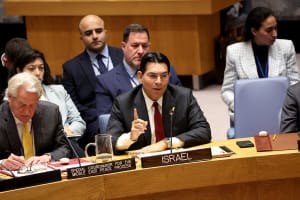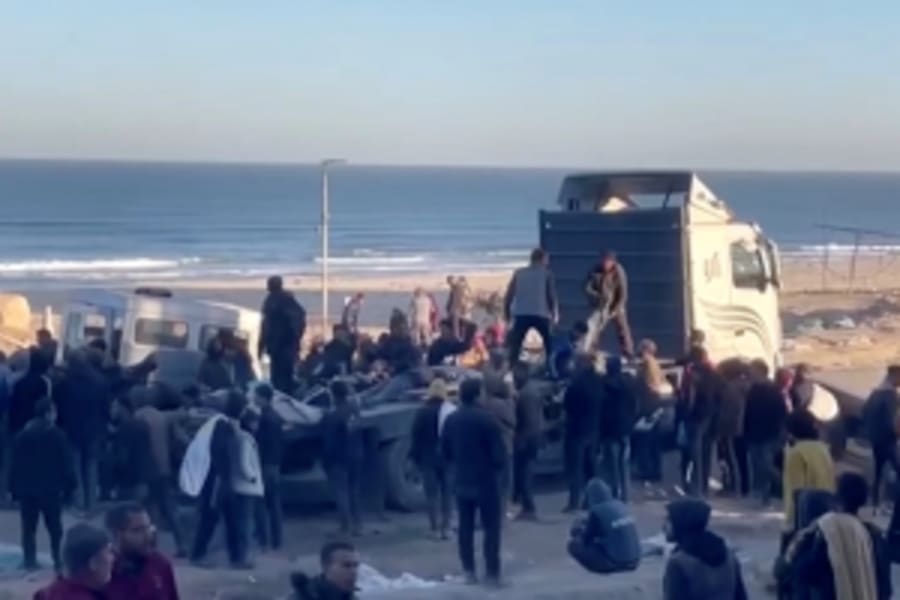‘Yes, but’ – Lebanon & Hezbollah reportedly agree to Israel ceasefire, US envoy Hochstein arrives in Beirut
Hezbollah and Lebanon aim to prevent Israeli right to military action in Lebanon

U.S. envoy Amos Hochstein arrived in Lebanon’s capital Beirut on Tuesday in a push to finalize a ceasefire between Hezbollah and Israel, after the terror group reportedly signaled its agreement to terms presented by the United States
Hochstein on Monday had delayed his planned arrival in Beirut to wait for more clarifications, but according to Axios, received a satisfactory answer two hours later.
On Monday, Ali Hassan Khalil, an aide to Lebanese parliament speaker Nabih Berri, who is leading the negotiations on Hezbollah’s behalf, told Reuters that Hezbollah and the Lebanese government agreed to the latest U.S. proposal in principle, but still reserved some comments.
“Lebanon presented its comments on the paper in a positive atmosphere,” Khalil said, adding, “All the comments that we presented affirm the precise adherence to Resolution 1701 with all its provisions.”
Hezbollah’s answer to the proposal was a “yes, but,” U.S. officials told the Axios news site. The terms of the agreement are reportedly based on UN Resolution 1701. However, Israel has allegedly sought U.S. guarantees for freedom of action in Lebanon to address violations of the agreement or imminent threats, a demand that has so far been rejected by Hezbollah, Lebanon and France.
Hochstein's trip to Beirut is widely seen as a sign that a ceasefire deal may be within reach. If talks in Lebanon go well, he is expected to travel to Israel on Wednesday.
According to Channel 13 News, the Israeli demand for freedom of action is the main obstacle to the talks at the moment. The solution currently proposed would see this demand answered via a “side letter” that would not be part of the ceasefire agreement itself.
According to the report, the text of this stipulation reads: “Israel has the right to defend itself and ensure its security on the northern border. The US is obligated to help Israel defend itself. The US supports Israel's right to act in Lebanon against imminent threats.”
The draft agreement envisions a 60-day transition period, roughly lasting until the inauguration of the new U.S. administration, during which the IDF would withdraw from southern Lebanon, while the Lebanese army would fill the vacuum and take up positions near the Israeli border.
Hezbollah would also withdraw – and, in particular, move – its heavy weapons north of the Litani River. The Saudi Al-Arabiya channel reported that the U.S. is demanding Lebanon to guarantee Hezbollah’s weapons smuggling would not be resumed.
Speaking at the Knesset on Monday, Israeli Prime Minister Benjamin Netanyahu reiterated that Hezbollah must withdraw north of the Litani River, and warned that Israel would not allow the terror group to rearm itself.
“We won't allow Hezbollah to go back to where it was on Oct. 6,” Netanyahu stressed.
Meanwhile, the “comments” by Lebanon and Hezbollah are aimed at countering Israel’s demands for freedom of action in Lebanon, according to a report by Lebanese newspaper L’Orient-Le Jour.
Lebanon requests that Israel rigorously comply with its side of Resolution 1701, including the cessation of its Air Force flying in Lebanese airspace, and a U.S. guarantee that Israel adheres to the terms of the agreement – countering Israeli plans for a side letter to the deal.
In addition, Lebanon is demanding that the committee responsible for monitoring the agreement be limited to the two parties, the U.S., France and the United Nations.
Lebanon also wants to add a paragraph stating that “both sides” will have the right to self-defense “only in case of a threat,” to limit Israel’s ability to justify future military actions on Lebanese soil.

The All Israel News Staff is a team of journalists in Israel.













